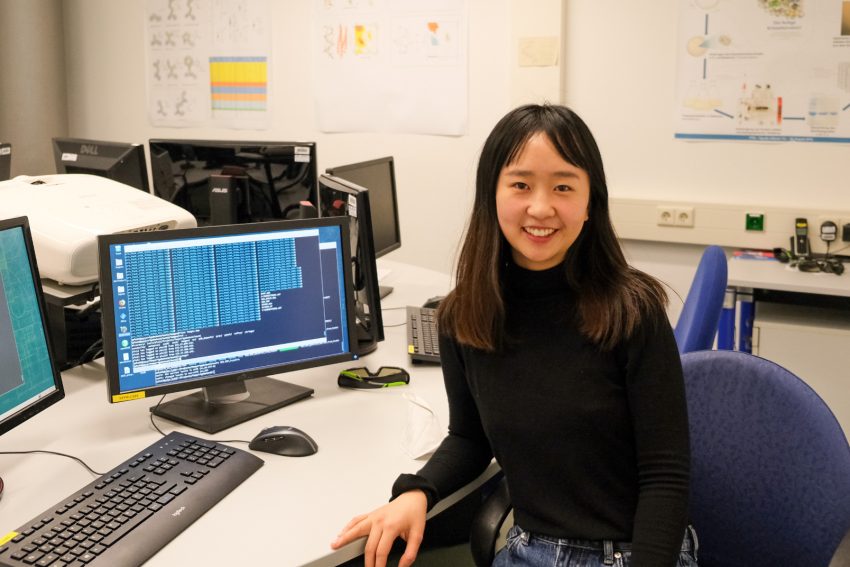Bioinformatics: Handling the Thousands A short portrait of Ruibing Shi from the PhD program “Drug Discovery and Chemical Informatics for New Anti-Infectives”
When dealing with diseases, an early diagnosis can save the day. Better even, when a drug can target a definite biological process of the disease, like in metabolism. However, the search for the relevant metabolites to select is the search for the needle in the haystack. Here, Ruibing Shi enters the stage. As a bioinformatician in the PhD program “Drug Discovery and Chemical Informatics for New Anti-Infectives” (iCA), she is developing a method to distinguish needle from hay.
Who are you and what is your research topic?
My name is Ruibing Shi and I come from China. I obtained my master degree in Bioinformatics at the Freie Universität Berlin in September 2020. Then, I started my PhD in October 2020 with Professor Frank Klawonn as part of the Biostatistics group in the Helmholtz Centre for Infection Research (HZI) in Braunschweig. As a bioinformatician, I am developing software tools for analyzing biochemical data. Particularly, I am working in the evolving field of metabolomics. This field of research studies the chemical processes involving metabolites. Metabolites are the small molecule substrates, intermediates and products of cell metabolism. The term “small molecules” refers to organic compounds with low molecular weight. Usually they have a size about one nanometer.
Which research question are you working on?
Mass spectrometry (MS) is the most widely-used analytical metabolomics platform. However, MS data is complex and massive. One of the biggest bottlenecks of metabolomics research is to identify and quantify the large numbers of unknown and structurally diverse compounds present in biological samples.
Machine learning methods become popular for statistical analysis due to the inherent of nonlinear data and the ability to process large and heterogeneous data rapidly. Particularly, metabolomics research apply techniques of machine learning to assist medical professionals and researchers in improving clinical diagnosis, disease prediction and drug discovery.
My goal is to implement a software tool based on machine learning methods for analysis of metabolic data. It is guided by metabolic pathway in order to improve confidence in the identification and quantification of metabolites. Then the software shall select features with the highest information, which is generally useful for biomarker detection.

As part of the project group “Biostatistics”, Ruibing Shi works on a software tool for analyzing metabolic sata with machine learning methods. Picture Credits: Ruibing Shi/HZI
What inspires you about your research? What makes this topic special/exciting for you?
My master study provided interdisciplinary courses, encouraging students to develop their own interests. I had the opportunity to develop my research interest during my internship and master thesis under Professor Frank Klawonn’s supervision. There, I learned what academic research is about and how to work on a research project independently. That led me into working as an academic researcher. Especially it makes me feel accomplished and glad when seeing the results of my models help other researchers to interpret their data and to validate their experiments hypothesis.
Why is your topic relevant to the pharmaceutical research?
Metabolites are small molecules present in a biological system including natural products and drugs. The field of metabolomics in turn, studies the endogenous and exogenous small, respectively low-weight metabolites in a biological system in a high-throughput manner. Various factors affect the composition of these endogenous compounds. Therefore, the study of metabolites and metabolism allows scientists to explore the nexus of gene–environment interactions. Metabolomics can provide information about possible novel drugs, indicate interesting targets for drug development and suggest binding partners of compounds.
That gives metabolomics a significant potential in pharmaceutical and clinical research. It includes not only the identification of new targets and the elucidation of the mechanism of action of new drugs, but also the characterization of safety and efficacy profiles, the discovery of biomarkers for early disease diagnosis and prognosis and treatment response monitorization.
What is special about participating in the PhD program “Drug Discovery and Cheminformatics for New Anti-Infectives (iCA)”?
The Program gives an opportunity for PhD researchers of different disciplines to cooperate and collaborate in an interdisciplinary field. For example, we have a collaboration with Dr. Raimo Franke from Chemical Biology group of the HZI. Through the collaboration, I gain an insight of the biological and chemical meaning of the data produced in the lab. Even more, I can better understand their research questions and so can improve the methods I implement.

